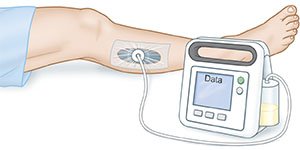Gunshot Wound to the Head or Neck
Medically reviewed by Drugs.com. Last updated on Jul 7, 2024.
AMBULATORY CARE:
A gunshot wound (GSW) to the head or neck
may cause damage to your brain, skull, spine, eyes, or major blood vessels.
Call 911 for any of the following:
- You have any of the following signs of a stroke:
- Numbness or drooping on one side of your face
- Weakness in an arm or leg
- Confusion or difficulty speaking
- Dizziness, a severe headache, or vision loss
- Have someone call 911 if you have a seizure or cannot be woken up.
- You feel lightheaded, short of breath, and have chest pain.
- You cough up blood.
- You have trouble breathing.
Seek care immediately if:
- Blood soaks through your bandage.
- You feel a hard lump in your neck.
- Your wound comes apart.
- Your arm or leg feels warm, tender, and painful. It may look swollen and red.
- You are vomiting blood.
- You have difficulty swallowing.
- You feel weak, dizzy, or faint.
Contact your healthcare provider if:
- You have a fever.
- Your wound is red, swollen, or draining pus.
- You have nausea or are vomiting.
- You have questions or concerns about your condition or care.
Treatment for a minor GSW to the head or neck
depends on what is found on an x-ray, ultrasound, CT, or MRI, and a physical exam by your healthcare provider. A GSW may be minor if it does not go deep into your skin or damage any of your organs or major blood vessels. Your healthcare provider may or may not remove the bullet from your GSW. He or she may clean your wound and close it with stitches or staples. You may be given medicine to treat pain or prevent infection. You may also need a tetanus shot. Tetanus is a severe infection caused by bacteria found in dirt, manure, and dust. Tell your healthcare provider if you have had the tetanus vaccine or a tetanus booster within the last 5 years.
Treatment for a major GSW to the head or neck
depends on how severe it is. You may need surgery or other procedures to repair damage.
Self-care:
- Rest for the first 24 hours. Slowly return to your normal activities as directed. You may not be able to play sports or do activities that may result in an injury to your head.
- Have someone wake you at different times during the night as directed. Have the person ask you a few questions to see if you are thinking clearly. An example would be to ask your name or your address.
Wound care:
- Care for your wound as directed. Remove your bandage before showering unless your healthcare provider tells you not to. Carefully wash the wound with soap and water. Dry the area and put on new, clean bandages as directed. Change your bandages when they get wet or dirty. Monitor your wound for signs of infection, such as redness, swelling, or pus.
- If you have an open wound, do not shower or get your wound wet. Your healthcare provider will tell you when your wound can get wet. Change the packing and bandage as directed. You may need to clean or rinse your wound each time you change the packing. Wash your hands before you remove packing and again before you place new packing. Ask your healthcare provider how to care for your open wound.
- Negative pressure wound therapy (NPWT) uses a machine called a wound vac, wound vacuum, or pump to help with wound healing. Suction from the machine removes excess drainage from your wound and pulls wound edges closer together. NPWT promotes healthy tissue growth by increasing blood flow to your wound. NPWT also reduce bacteria that cause infections. You and your healthcare providers will be taught about your specific NPWT machine, alarms, and dressing changes.

Get support:
It is normal to have difficult and unexpected feelings after being shot. You may have feelings such as anger, depression, fear, or anxiety. You may have nightmares or continue to think about what has happened. Talk to your healthcare provider if you have any of these feelings. Treatments are available to help you.
Follow up with your doctor as directed:
Write down your questions so you remember to ask them during your visits.
© Copyright Merative 2024 Information is for End User's use only and may not be sold, redistributed or otherwise used for commercial purposes.
The above information is an educational aid only. It is not intended as medical advice for individual conditions or treatments. Talk to your doctor, nurse or pharmacist before following any medical regimen to see if it is safe and effective for you.
Learn more about Gunshot Wound to the Head or Neck
Care guides
Further information
Always consult your healthcare provider to ensure the information displayed on this page applies to your personal circumstances.
